Farm Fresh Eggs | What’s the Difference and How to Use Them Safely
We’ve become accustomed to running to the store to pick up a dozen eggs. But in reality, there can be a big difference between eggs bought at your local grocery store vs. eggs purchased directly from a farm. We will breakdown the differences and how to handle farm fresh eggs for the best and safest results!
How to Select Eggs from the Grocery Store?
You go to the store to pick up eggs for your morning omelet and are hit with a barrage of options. All natural, farm fresh, cage free, organic – how do you know what to buy and what the differences really are?
What’s a Standard Conventionally Raised Egg?
When it comes to eggs from the grocery store, according to this NPR article, roughly 95% of eggs produced in the United States are from hens raised in what are referred to as “battery cages”.

These are cages that house on average 8 birds and give each chicken about 67 square inches of floor space. This is similar to the size of an iPad or a standard 8” x 11” piece of paper.
These cages are stacked on top of each other. So, upwards of a thousand birds will fill one barn. Hens in these facilities are typically fed a combination of corn with other animal byproducts.
The majority of eggs in the supermarket come from eggs raised in factory-farmed systems as described above. But there’s a growing trend of wanting to buy better eggs. So, what about the rest of the lingo on egg packaging?
What do the Different Terms Mean on Egg Packaging?
Cage Free Eggs
Most people think this means chickens are spending time outdoors. But this is far from the truth. Being labeled “cage-free” is a government-defined label meaning that there must be at least 1.2 square feet per chicken. No access to the outdoors, grass, or the sun. Just as it sounds, free of cages but basically nothing else.
Free Range Eggs
Free range is also a government regulated term for egg cartons. It means that each chicken must have at least 2 square feet of outdoor space. So, in addition to the ability to roam, they must also be able to access the outdoors. While this sounds good and is certainly an improvement, this small amount of outdoor space usually looks like a small fenced in patio on cement or dirt ground.
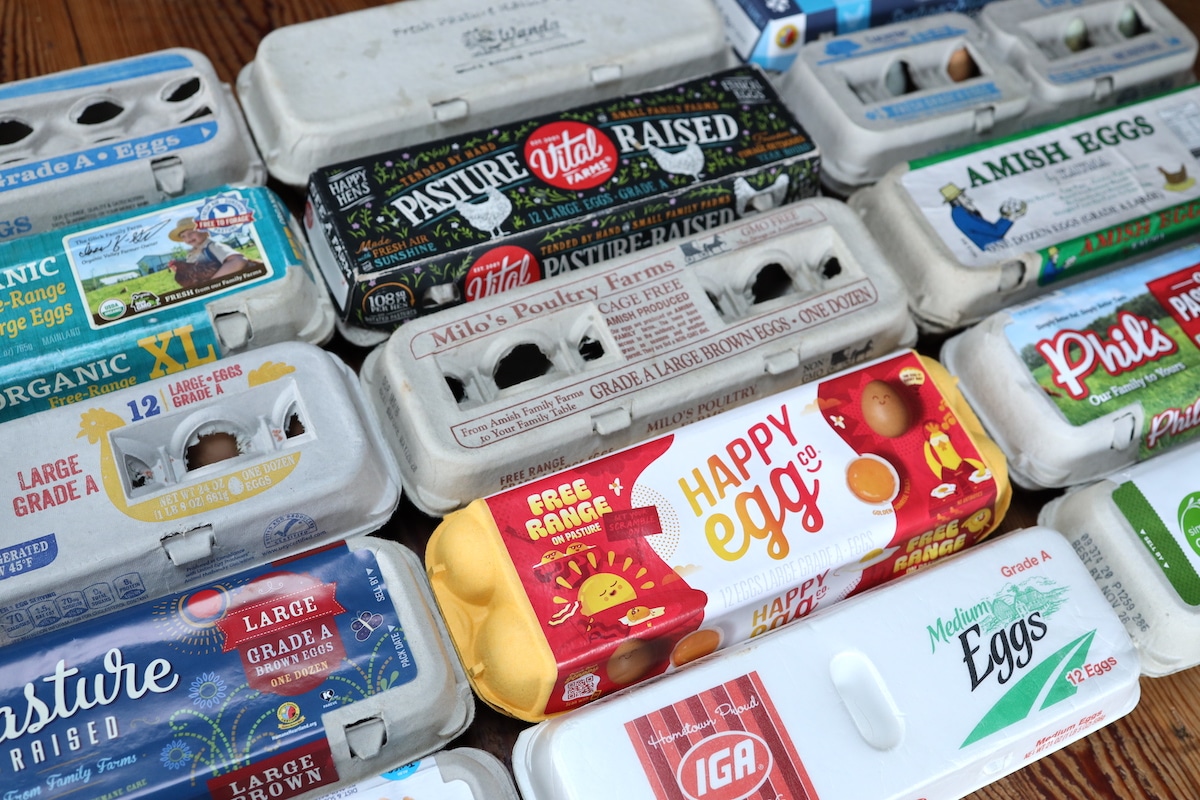
Pasture Raised Eggs
Pasture raised is an unregulated term by the USDA and Government agencies. In that regard, it is open to interpretation by producers of how it is used and labeled on cartons.
However, in recent years, other third-party agencies like the American Welfare Institute and Humane Farm Animal Care have created their own certifications and definitions for pasture raised eggs. If you see a carton with the “Certified Humane”, “American Humane Certified” or “Animal Welfare Approved” certification AND a carton is labeled as “pasture raised” it means that the chickens must be raised on 2.5 acres per 1,000 hens or 108 square feet per chicken. This is a huge improvement!
This is where doing your research is important as a consumer! Companies like Vital Farms is one of the few to offer this certified humane and pasture raised label.
Organic Eggs
Organic is another regulated term in the egg industry. It primarily refers to the feed that chickens receive. By definition, organic eggs mean that chickens must be fed organic certified feed, be cage-free so they can roam, and have access to the outdoors in some capacity. Essentially, organic is the same as the “free range” label while also being fed an organically grown diet.
Omega-3 Eggs
This nutritional variation in eggs is determined by the feed that the animal gets. Eggs that claim to be Omega-3 eggs mean that the hens are generally fed flaxseed which is high in omega-3 fatty acids.

Vegetarian Diet Eggs
Sounds good, right? You picture chickens munching away at kale leaves. Except chickens are omnivores and their typical diet would include plenty of bugs, grasshoppers, worms, etc. An egg carton claiming that the chickens are fed a vegetarian diet typically means a diet of non-organic corn fortified with some amino acids for protein. This label is also unregulated.
Unregulated Terms
Other terms that are unregulated and essentially mean nothing on packages include: farm fresh, all natural, hormone free, vegetarian fed.
Farm Fresh Eggs vs. Store Bought
Hopefully, this helps you be more informed as an egg consumer in knowing where the standard grocery store egg came from and what to look for if purchasing eggs.
This is also why we are big advocates of buying farm fresh eggs directly from a local farm, farmer’s market, or co-op. When doing so, there’s much less need to worry about questionable claims and labels. Typically, the eggs come from healthy hens in much more ideal conditions than what we described above.
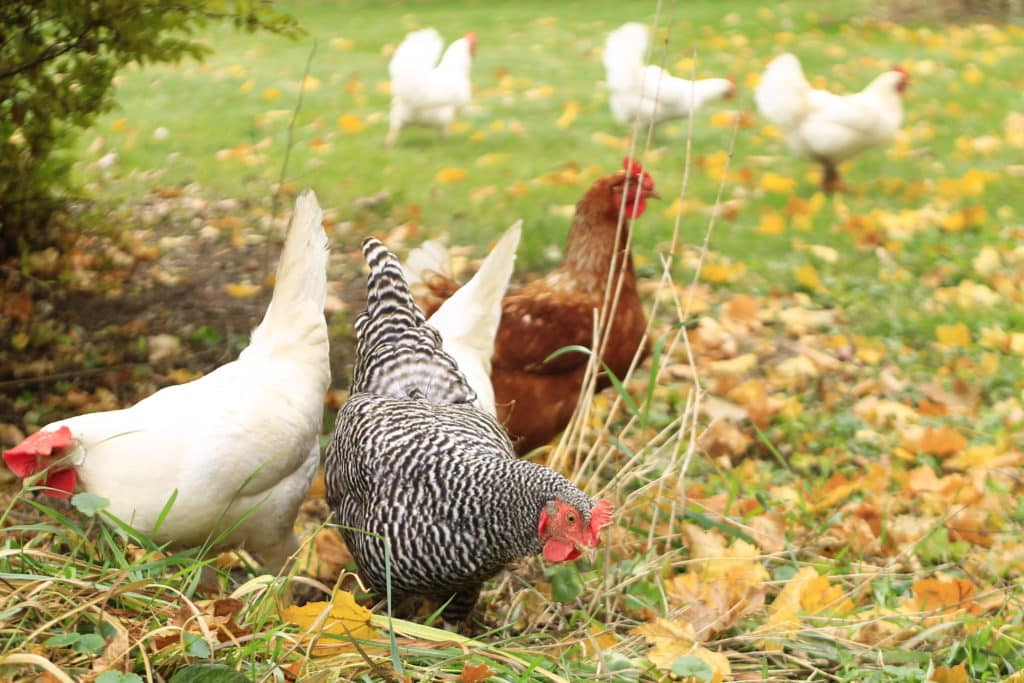
Of course, it’s always important to do your research. This is one of the benefits we see in buying eggs fresh from the farm. You can talk to the farmer, visit the farm, ask questions, and hopefully see firsthand where these farm fresh eggs are coming from.
Good Questions to Ask Your Farmer When Purchasing Farm Fresh Eggs?
How are the chickens raised? Meaning do they have sufficient access to the outdoors, bugs, and grass or are they kept in indoor coops?
What are they fed? Organic vs non-organic feed? If soy is an issue for you, finding soy-free eggs may be something to consider. Do they get other food scraps and can they regularly forage for bugs, worms, and other insects?
Is the coop and conditions clean? This is a great one to go check out for yourself!
In our experience most farms and homesteaders that raise eggs are not doing it to make money but because they genuinely care about where their food comes from and do all they can to ensure an optimal life and health for their flock. But, it’s always important to do your own research!
How to Safely Handle Farm Fresh Eggs
Should Farm Fresh Eggs Be Washed?
The short answer, is NO! When an egg is laid, it naturally comes with a coating called the bloom. The bloom was specifically designed to be a layer of protection for the egg and keep bacteria out. When an egg is washed, the bloom is destroyed making the egg much more susceptible to bacteria. If an egg is washed it should be immediately refrigerated and eaten as soon as possible.

If you do need to wash a farm fresh egg to clean any dirt or debris that may have found its way onto the shell, the best way to do this is with warm water. Warm water helps the contents of the egg to expand making it more difficult for unwanted bacteria to penetrate the porous shell of an egg. Cold water does the opposite making the egg more susceptible to exposure to bacteria.
On our homestead, our daily collection of farm fresh eggs is usually very clean and great for eating without any washing. Occasionally, if there is a little bit of something on the shell, we’ll leave it unwashed on the countertop and just wash it right before we crack it open for use. From time to time, we’ll get a dirty egg that needs to be washed right away. We will either feed it to one of our dogs or wash it in warm water, store it in the fridge, and eat it up within a day or two.
How Long Are Farm Fresh Eggs Safe to Eat?
One of the biggest perks of buying eggs fresh from the farm is that you are likely getting them within just a few days of being laid. This is quite different from eggs from the grocery store which are typically between one and two months old before they even hit the shelves.
There is a definite advantage here in buying the freshest eggs which will have much less nutrient loss than eggs that have been sitting around for well over a month!
Farm fresh eggs store just fine on the counter, unwashed for at least 2 weeks. After that, you can store them in the refrigerator for up to 3 months.
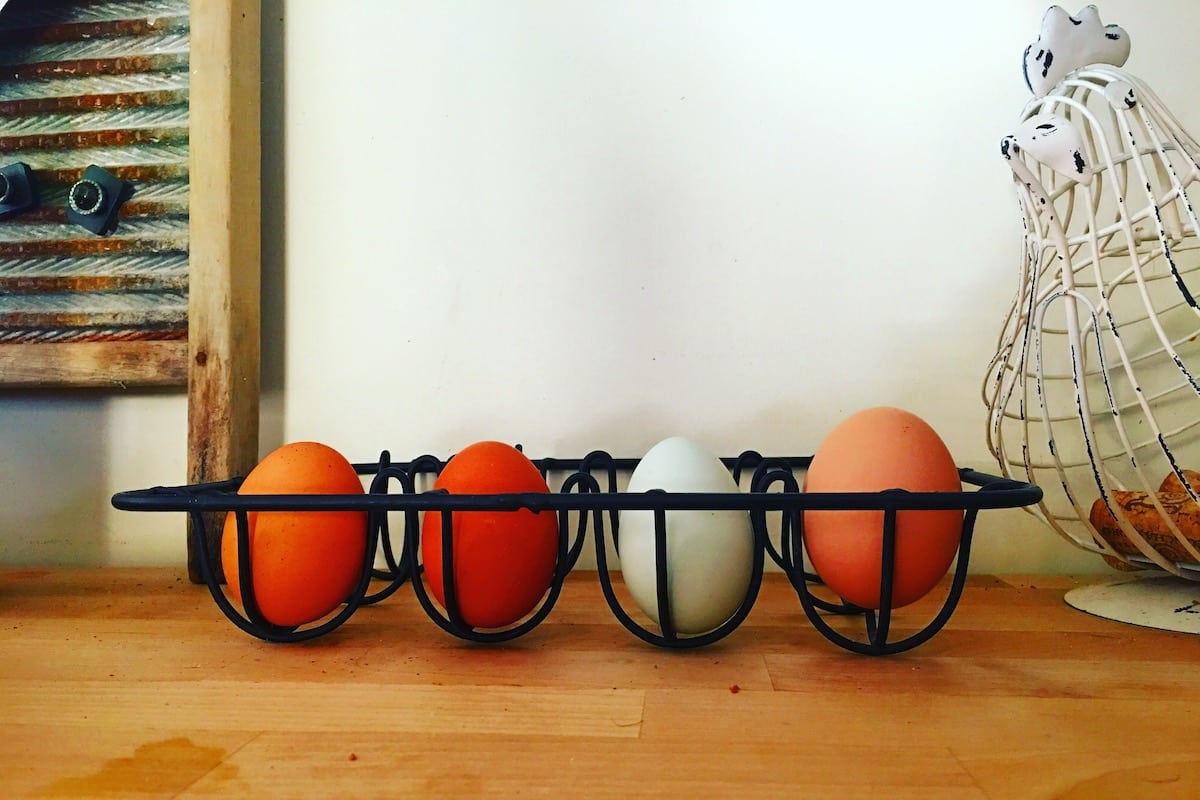
If you are unsure how old your farm fresh eggs are and whether or not they are safe for eating, you can always give them the float test.
Float Test for Farm Fresh Eggs
A fresh egg should quickly sink when put in a bowl of water. If the egg floats, then you know this egg is not fresh or suitable for eating and should be discarded. The float test is especially useful when we discover a pile of eggs in some abnormal place on the farm and are not sure how long they’ve been sitting there.
What about Fertilized Eggs?
If there is a rooster on your farm, then some of the eggs will be fertilized. There is no visible difference in outward appearance between a fertilized and unfertilized egg. They are completely safe to eat and do not taste any different.
Sometimes you will notice a small dot of blood in a cracked egg. This is typical and completely safe to eat. However, it is always good to crack your eggs in a separate bowl before use to make sure everything looks as it should.
Store Farm Fresh Eggs Pointy Side Down
Contrary to what may look normal, eggs are best stored pointy side down. This is because there is a naturally occurring air bubble at the rounded side of the egg. By storing eggs point side down, it keeps the air bubble at the top and the yolk centered. This preserves the freshness of the egg and helps them last longer!
How to Preserve Farm Fresh Eggs
Like most things on the farm and in nature, egg laying is seasonal. Typically, March-September are peak time for egg production. Shorter days in the cooler months and other factors like chicken molting can cause a steep decline in egg production from a laying flock.
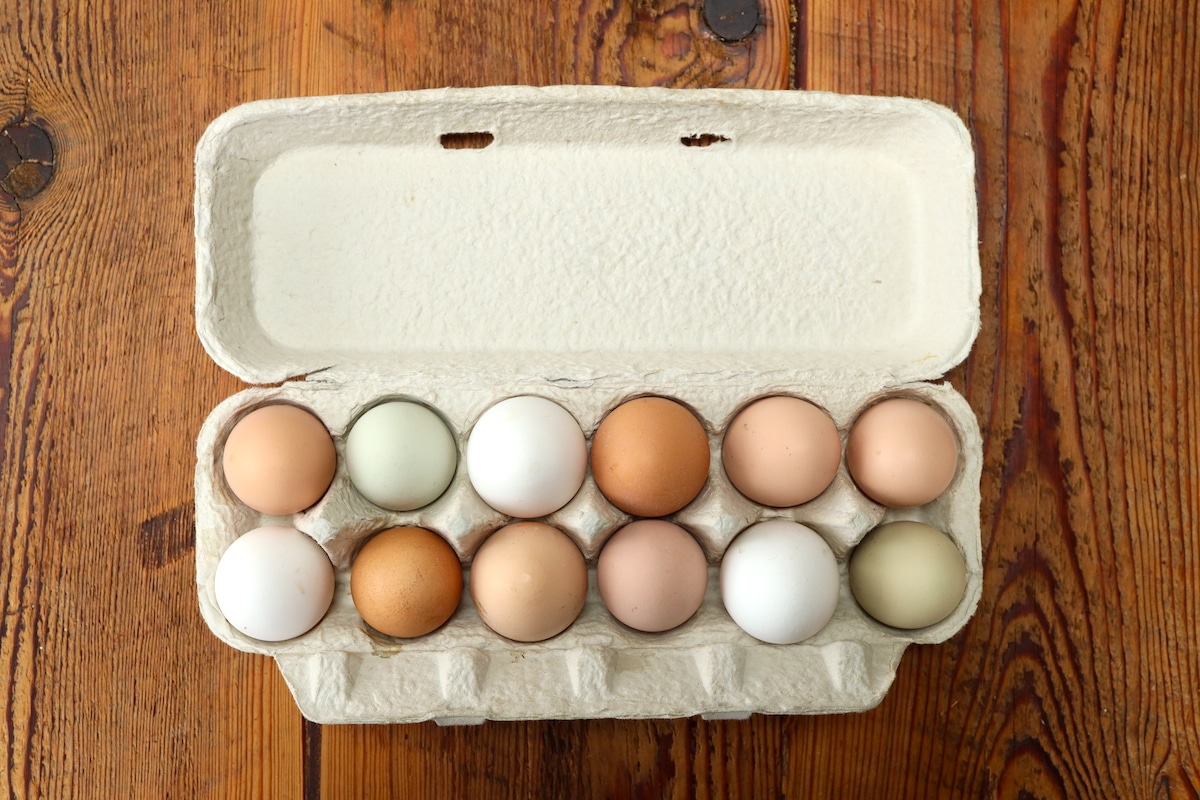
This means, when eggs are in abundance on these warmer, sun-filled days, you may want to consider preserving them to pull out in the winter when farm fresh eggs can be harder to come by.
There are several methods of preserving eggs including water glassing, freezing, dehydrating, and freeze-drying. This article goes into more detail about the ins and outs of long-term egg preservation.
A Final Plug for Farm Fresh Eggs
While there can be fears and timidity around getting eggs fresh from the farm, we’ve come to see the vast benefits of purchasing eggs this way. They are typically fresher, more nutritious, taste better, and often provide an all-around better environment for the chicken itself.
For more on chickens and keeping your own chickens on your farm or in your backyard, check out these posts:
- Can Chickens Eat Cheese? | How To Nourish Your Backyard Flock!
- Simple Outdoor Chicken Brooder Ideas
- Simple DIY Chicken Coop Inside Your Barn
- Cornish Cross vs. Freedom Ranger Chickens
- How To Care For Chickens In The Winter Basics
- Cost of Raising Chickens for Meat on a Small Scale
Pin it for later!





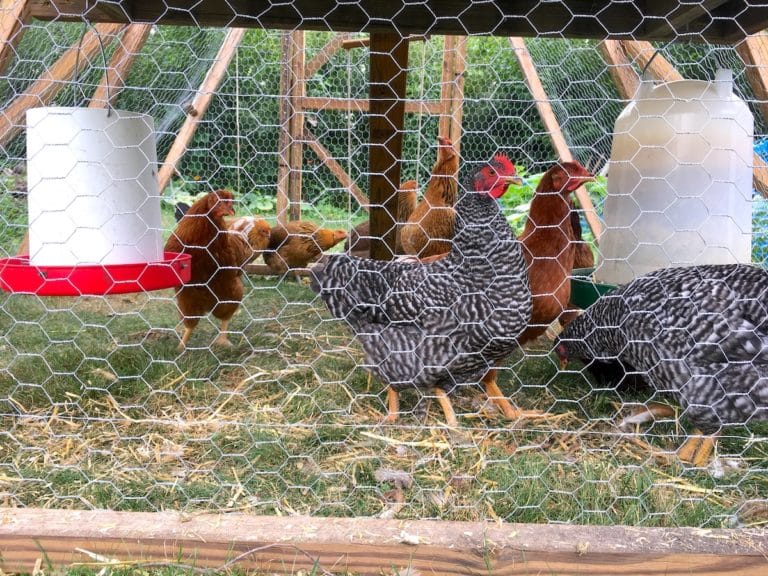
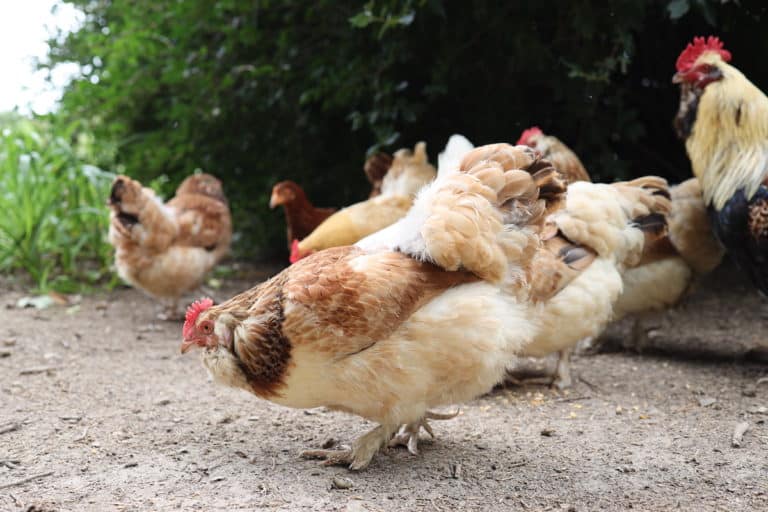
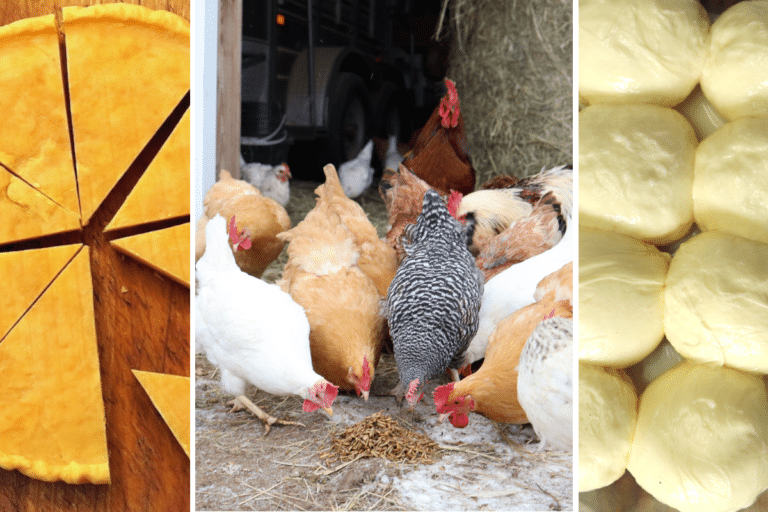
Great info! Thanks
Glad it was helpful!
thank you for this!
You’re welcome! Glad this information is helpful!
The taste difference is amazing! Once you go from store eggs to farm eggs, you’ll never want to go back. We have about 16 hens (should really go count them), and eat all their eggs! So good.
Yes!! You are so right. I forget about the taste difference since that’s really all we eat until others comment on how good they are. Keep it up!
Hi, impressed with your shampoo bars. Can I use them for the body? Any way I can purchase them from you?
With gratitude, Tzvetanka!
Hi! They make great soap for the body as well! Unfortunately our family doesn’t have the capacity right now to make these in bulk and ship them. Thank you so much for your kind words and interest!